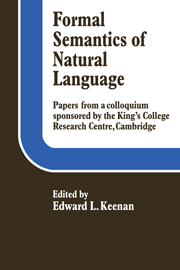Book contents
- Frontmatter
- Contents
- Notes on the contributors
- Acknowledgements
- Introduction
- I QUANTIFICATION IN NATURAL LANGUAGE
- II REFERENCE AND CROSS REFERENCE
- III INTENSIONAL LOGIC AND SYNTACTIC THEORY
- IV QUESTIONING MODEL THEORETIC SEMANTICS
- V PRAGMATICS AND SENTENCES IN CONTEXT
- VI SEMANTICS AND SURFACE SYNTAX
- Arguments for assigning tense meanings after certain syntactic transformations apply
- Towards a formal treatment of the phenomenon of aspect
- On the relations between syntax and semantics
- Logical expressive power and syntactic variation in natural language
Towards a formal treatment of the phenomenon of aspect
Published online by Cambridge University Press: 05 November 2011
- Frontmatter
- Contents
- Notes on the contributors
- Acknowledgements
- Introduction
- I QUANTIFICATION IN NATURAL LANGUAGE
- II REFERENCE AND CROSS REFERENCE
- III INTENSIONAL LOGIC AND SYNTACTIC THEORY
- IV QUESTIONING MODEL THEORETIC SEMANTICS
- V PRAGMATICS AND SENTENCES IN CONTEXT
- VI SEMANTICS AND SURFACE SYNTAX
- Arguments for assigning tense meanings after certain syntactic transformations apply
- Towards a formal treatment of the phenomenon of aspect
- On the relations between syntax and semantics
- Logical expressive power and syntactic variation in natural language
Summary
Introduction
The objective towards which we are working is the development of a French Recognition Grammar (FRG) capable of being automatized. Apart from the purely formal aspects (development of the model, logicomathematical definition of the operators, writing the rules), such an enterprise must necessarily have its basis in a linguistic theory; in this work the essential linguistic concepts are borrowed from A. Culioli (see Culioli (1971) and Culioli, Fuchs, and Pecheux (1970)). The aim of this paper is not to expound or justify the theory, but rather to show how, from this theoretical starting point, the linguistic phenomenon of aspect can be treated within the framework of an FRG.
We shall note very briefly that the chief characteristic of the theory we adopt is that it takes into account the whole dimension of ‘utterance’. Our basic assumption is that syntactic structures (to which may be added an interpretation of the lexical units by means of semantic features) cannot on their own satisfactorily account for a certain number of phenomena such as the different roles of determiners, the choice of the passive as opposed to the active, the use of auxiliaries, tenses, ‘presenters’, etc. Even less can this level of explanation account for the ties of affinity or the rules of exclusion which exist among these different phenomena. Worse still: certain phenomena which seem at first sight to belong to the realm of syntax (e.g. complex sentences, relative clauses) can be treated solely in terms of structural concepts (e.g. ‘embedding’) only if one takes certain theoretical decisions which are likely to conceal more problems than they elucidate.
- Type
- Chapter
- Information
- Formal Semantics of Natural Language , pp. 373 - 388Publisher: Cambridge University PressPrint publication year: 1975
- 1
- Cited by



